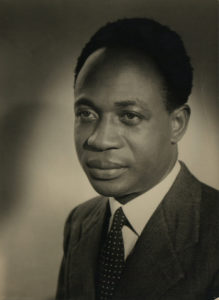
Kwame Nkrumah
*On this date, we mark the birth of Kwame Nkrumah in 1909. He was a Black African Statesman and political activist from Ghana.
He was born in the town of Nkroful in the southwestern corner of the British colony of the Gold Coast. As a teenager, he was an excellent student in local Catholic missionary schools and became an untrained elementary school teacher in the nearby town of Half Assini.
In 1930, at Achimota College in Accra, the capital of the Gold Coast, Nkrumah earned a teacher's certificate and taught at several Catholic elementary schools. In 1939, he graduated from Lincoln University with B. A. degrees in economics and sociology, earned a theology degree from the Lincoln Theological Seminary in 1942, and received M. A. in education and philosophy from the University of Pennsylvania in 1942 and 1943. While studying in the United States, Nkrumah was influenced by the socialist writings of German political philosopher Karl Marx, German political economist Friedrich Engels, and Russian revolutionary leader Vladimir Lenin. He formed an African student organization and became a popular speaker, advocating the liberation of Africa from European colonialism.
He also promoted Pan-Africanism, a movement for cooperation between all people of African descent and for the political union of an independent Africa. In 1945, he went to London to study economics and law. That year, he helped organize the fifth Pan-African Congress in Manchester with Black American sociologist and writer W. E. B. Du Bois, future president of Kenya Jomo Kenyatta, and American actor and activist Paul Robeson. In 1946, Nkrumah left his academic studies to become secretary-general of the West African National Secretariat. That same year, Nkrumah became vice president of the West African Students Union, a pro-independence organization of younger, more politically aggressive African students studying in Britain.
Nkrumah returned to the Gold Coast in 1947 when the United Gold Coast Convention (UGCC), a nationalist party, invited him to serve as its secretary-general. He gave speeches throughout the colony to rally support for the UGCC and independence. In 1948, Nkrumah and several other UGCC leaders were arrested by British colonial authorities and briefly imprisoned. After setting up a series of colony-wide strikes in favor of independence that nearly brought the colony’s economy to a standstill, Nkrumah was again imprisoned for subversion in 1950.
However, the strikes convinced the British authorities to move the colony toward independence. In 1951, while still in prison, Nkrumah won the central Accra seat by a landslide. The British governor of the Gold Coast released Nkrumah from prison and appointed him leader of government business. The following year, he named him Prime Minister. Reelected in 1954 and 1956, Nkrumah guided the Gold Coast to independence in 1957 under the name Ghana after an ancient West African empire.
Nkrumah built a strong central government and attempted to unify the country politically and muster all its resources for rapid economic development. As a proponent of Pan-Africanism, he sought the liberation of the entire continent from colonial rule, offered generous assistance to other African nationalists, and initially pursued a policy of nonalignment with the United States and the Union of Soviet Socialist Republics (USSR).
His goal was never realized, but his efforts helped create the Organization of African Unity, which promotes peace and cooperation between African nations. Between 1961 and 1966, Nkrumah put together an ambitious and very expensive hydroelectric project on the Volta River that was highly successful but laced with economic mismanagement and several other developmental schemes.
Nkrumah did not hesitate to use strong-arm methods to implement his domestic programs. He remained popular with the masses, yet his tactics made enemies among civil servants, judges, intellectuals, and army officers. While Nkrumah was visiting China in 1966, his government was overthrown in an army coup. Nkrumah lived in exile in Guinea, where Guinean president Sékou Тоигй appointed him honorary co-president of Guinea. He died in 1972 in Romania while receiving treatment for throat cancer. Kwame Nkrumah's remains were returned to Ghana for burial in his hometown.